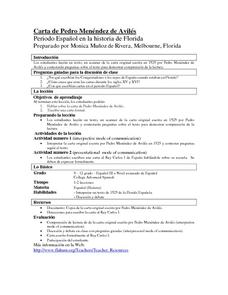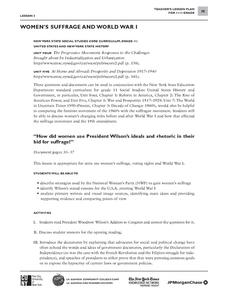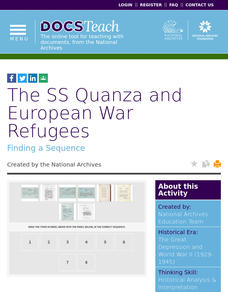Curated OER
Carta de Pedro Menéndez de Avilés
Spanish learners peek back into history by reading a copy of an original letter written in the sixteenth century by Pedro Menéndez de Avilés. To show their comprehension, they respond to a series of provided questions. For writing...
The Alamo
A Lesson in Citizenship
What does it mean to be an American citizen? Lieutenant Colonel Commander William Barret Travis believed that it meant honor to country first—even above one's own life. Middle and high schoolers read his final letters from the Alamo that...
Center for History Education
How Did the Public View Women’s Contributions to the Revolutionary War Effort?
Calling upon the legacies of Joan of Arc, Elizabeth I, and Catherine the Great, Esther Reed rallied Southern women to support the American Revolution. Using a broadside by Reed and other primary sources, such as poetry, young historians...
National Endowment for the Humanities
American Utopia: The Architecture and History of the Suburb
Let's build a dream house! By examining promotional materials and photographs of early suburban developments, scholars consider what led to the development of this particular American dream. The resource includes case studies of three...
PACER Center
Notifying the School About a Bullying Incident—Using a Template Letter
A pre-made letter is ideal for parents to use if their child is being bullied. The template comes with a brief overview for implementation, as well as two separate 504 and IEP templates to address bullying instances. Use the document...
Curated OER
How Were European Nations Capable of Dominating the African Continent?
Primary source documents provide a realistic context for pupils to explore. Included are 5 experts relating European ideals and methods for colonizing and controlling the African continent. Middle schoolers answer 4 critical-thinking...
Towson University
Looking Backwards, Looking Forward
How do scientists know what Earth's climate was like millions of years ago? Young environmental scholars discover how researchers used proxy data to determine the conditions present before written record. Grouped pupils gain experience...
City University of New York
Woman's Suffrage and World War I
How did women use President Wilson's ideals and rhetoric in their bid for suffrage? To answer this essential question, class groups analyze primary written documents and visual images.
Curated OER
Finding James Fort
Welcome to Jamestown! Third and fourth graders read and analyze primary source documents about Jamestown or Fort James. They read and analyze descriptions of Fort James from primary sources. They access a website to explore more...
Curated OER
Who Fought for the Union?
Learners read New York Times articles, letters, and listen to songs written from a soldier's perspective during the Civil War in order to understand who was fighting in the Union Army. This is a great lesson, complete with weblinks,...
Curated OER
Lesson: Lisa Signal: Altering Perspectives
Kids make big artistic gestures, just like the abstract artist, Lisa Signal. They use her work as inspiration for making simplistic, abstract, statements in an artistic way. They analyze her work, then walk through an unfamiliar...
Curated OER
MLK Letter From Birmingham Jail Analysis
Designed as a PowerPoint presentation for AP English class, this resource provides a detailed analysis of the content, format, and purpose of Dr. Martin Luther King, Jr’s “Letter from the Birmingham Jail.” Because much of the...
University of California
Roots of the Cold War
When and how did the Cold War begin? To answer this question, you will not find a better-organized, in-depth, activity- and inquiry-based resource than this! Executing best teaching practices throughout, each portion of this inquiry...
Scholastic
Voyage on the Mayflower for Grades 3-5
Following an online activity, scholars complete a Grafitti Wall in which small groups write words and phrases on chart paper pertaining to Pilgrims, the Mayflower, and Thanksgiving. Pupils perform a close reading then answer a series of...
Curated OER
Newspaper Article Analysis Worksheet: World War I
In this newspaper analysis instructional activity, high schoolers review an article of their choosing and respond to 6 analytical questions.
Polk Bros Foundation
I Can Analyze a Story or History Completely and Carefully
Start off analysis of a text with a instructional activity that asks pupils to complete several tasks. Class members note down a couple of characters or people and their distinguishing traits, describe the most important event, summarize...
Historical Thinking Matters
Rosa Parks: 5 Day Lesson
What led to the success of the Montgomery Bus Boycott, and how might historians approach this question differently? This rich series of lessons includes a short introductory video clip, analysis of six primary source documents, and...
Gilder Lehrman Institute of American History
Harriet Beecher Stowe Sends Uncle Tom’s Cabin to Victoria and Albert, 1852
Harriet Beecher Stowe's plea for abolition is not only laid plain in her acclaimed novel, Uncle Tom's Cabin, but in her written correspondence as well. High schoolers read a letter written by Stowe to Prince Albert and Queen Victoria to...
DocsTeach
The SS Quanza and European War Refugees
World War II not only resulted in major loss of life, but it also displaced thousands of people. An eye-opening activity uses primary documents to explore the refugee crisis during World War II. Scholars compare the event to modern-day...
DocsTeach
How Effective were the Efforts of the Freedmen’s Bureau?
The legacy of Reconstruction and the Freedman's Bureau is complicated. Using an interactive web resource, learners literally weigh the evidence using an online program in primary sources such as labor contracts and marriage records to...
National Woman's History Museum
Country to City
After reading a series of primary source documents, groups compare the lives of and opportunities available to rural and urban women in the 19th century to rural and urban life in the 21st century. As an exit ticket, individuals craft a...
Green Hope High School
Close Readings from The Tempest + New World Readings
What was Shakespeare's intent? That is the question at the heart of a summer assignment designed for AP English Literature. Class members focus on five scenes from The Tempest and compare the interactions of Prospero, Caliban, and...
California Education Partners
Glass Menagerie
As a reading comprehension assessment, ninth graders are asked to use evidence drawn from The Glass Menagerie to support an analysis of how Tennessee Williams uses specific lines to develop Amanda's character as well as her relationships...
Curated OER
Carta del tratado entre España y los Estados Unidos
Explore the history between Spain and the United States. Class members examine a copy of an original letter written in 1821 by Colonel Jose Coppinger in St. Augustine, Florida about the treaty that refers to the Florida territory that...

























